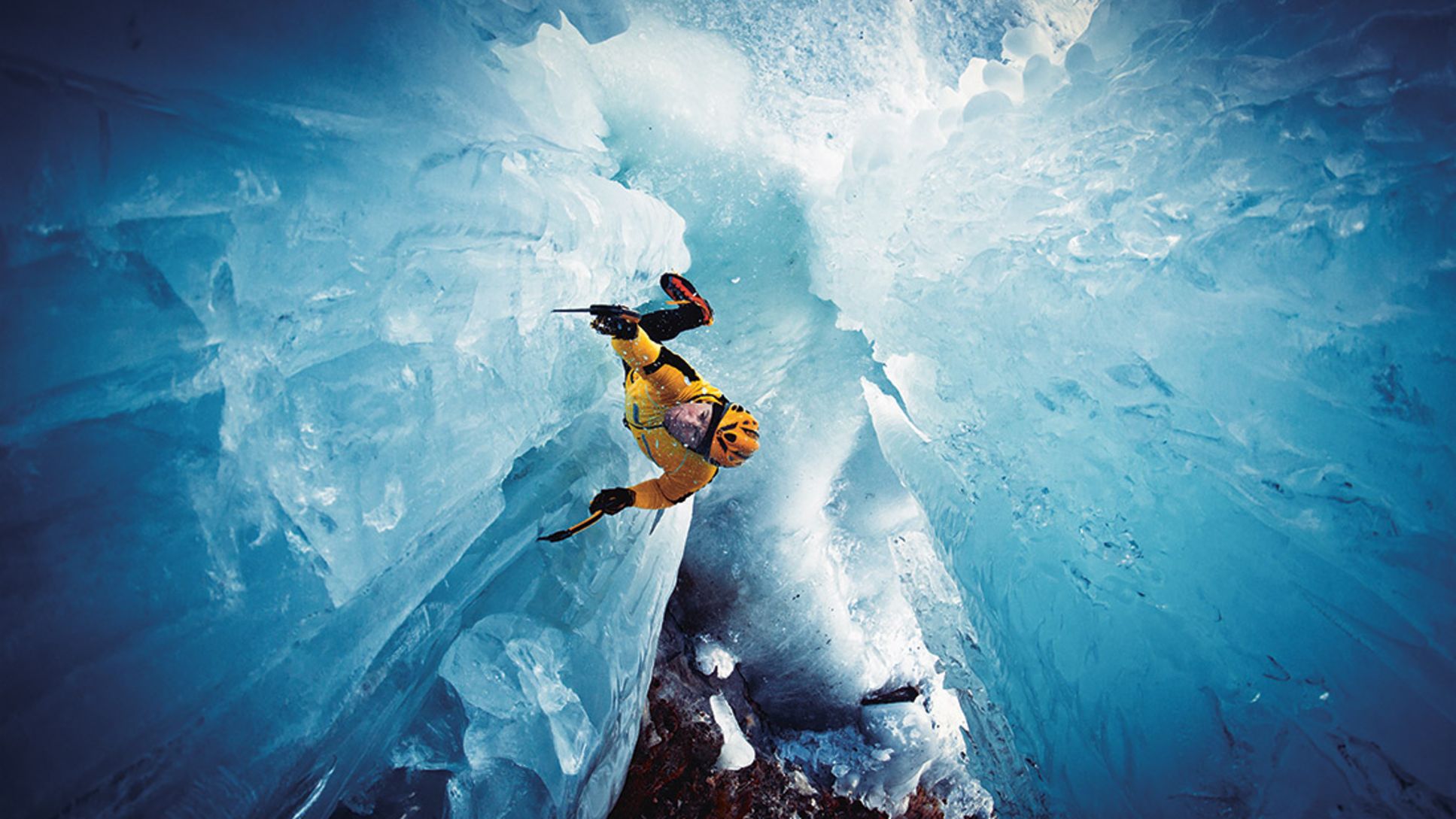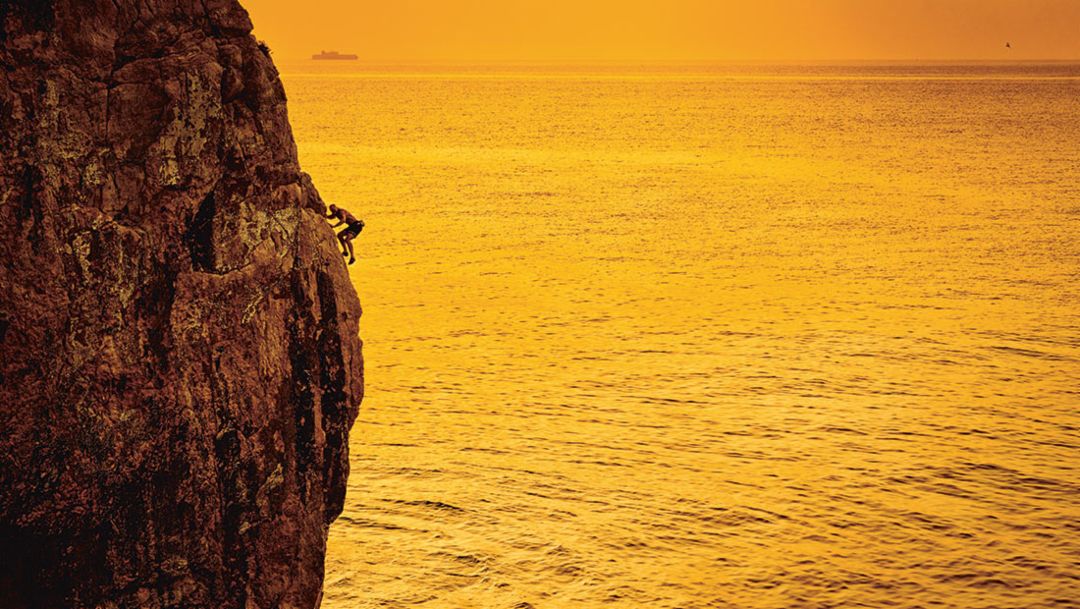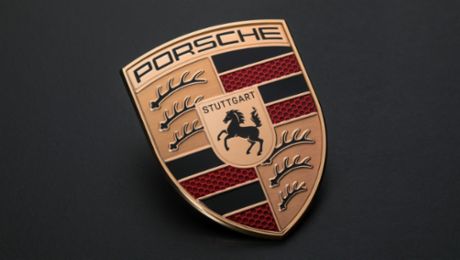Tours with Thomas Bubendorfer, regardless whether he goes on them alone or with a group, always end up inside the ego. It's no different high above the French Riviera, on the shores of the blue bay of Cap Ferrat. It is a walk in the footsteps of Friedrich Nietzsche, who took the uphill path to Èze to write "Thus Spoke Zarathustra", his book "Book for All and None". It is a steep, stony terrain, just perfect for the Macan. But we have left the car below in Monte Carlo, where it can shine resplendently. Up here, pine trees grow from the cliffs. You don't dare lose your footing.
"Follow your own path"
It ought to be nothing more than a warm-up for a mountain climber like Bubendorfer, who as the youngest in his trade has mastered solo climbs up the great faces of the Alps. He looks very fit, still at the age of 52. 100% fit. But he does not take this path lightly. Because it is definitely not just a matter of speed and degree of difficulty. It is about movement, just like Nietzsche had prescribed: "Follow your own path." The native Austrian stops a moment at a hairpin bend, turns to those accompanying him and offers encouragement: "Everybody has to discover their own pace." And he talks about managers who sat here and suddenly felt something, which they had no longer known: "The feeling for what is good for you."
Bubendorfer is a kind of emotional engineer. It comes as no surprise, then, that he has been driving a Porsche for a long time; nor is it a coincidence that he speaks at the Porsche Museum or in front of Porsche managers. Because he has brought back with him a lot more than just spectacular pictures from the great peaks of this world. He relates his experience, his strategies, his research findings in a programme, which he has dubbed Intelligent Peak Performer. These approaches, related to people, of an intelligent development of performance potentials while preserving inner resources show exciting parallels to the efficiency and performance strategy of the sports car maker – the Porsche Intelligent Performance. At Porsche, this is the name of a harmonic overall concept, which sustainably unites dynamism and efficiency, performance and safety, sportiness and everyday practicality in its combination of clever approaches. Bubendorfer explains the connection: "Porsche is responsible for the exterior of the driver; I am responsible for the inner self."
The released potential automatically boosts quality of life
If you have set yourself up for a friendly shop talk among sports car enthusiasts, you will be disappointed. Or better: surprised. "Many people know more about their car than they do about their body." Naturally, he is being provocative but he knows why he is saying it. Bubendorfer doesn't just know extremes from the steep faces of the mountains. He also knows the great demands and difficulties people have to face in today's working world, which are no less challenging. Just as Porsche translates the experience from motor racing into performance on the road, the extreme climber transfers his convictions – from the mountains to life. There is always enough power – it only has to be released at the right moment and then used properly. The released potential automatically boosts quality of life as well. To take responsibility for yourself ultimately creates confidence in yourself. Much of this is all a matter of balance. While we climb up the path, Bubendorfer refers to it as "dealing with the circumstances intelligently".
And he, whose happiness and life sometimes was dependent on only two or three fingers, knows all about doubt and despair too. On his part, he appreciates this huge freedom of being alone. According to his doctrine, to be ready to make the right decisions for yourself has much to do with your own sense of being prepared. With your inner torque. Namely, with the intelligent one. To connect philosophy and sports, which he has done in numerous books, is based on a primal experience he had. At 15, Bubendorfer could do 300 pull-ups a day. He could run 40 kilometres a day, too. His grandfather was waiting for him at the door and asked: "And what did you do for your head?" After Thomas had answered that he went to high school in the morning, his grandfather said: "You do more exercise than the others do. So you will have to do more intellectually, too." He dedicated himself to reading a hundred pages of literature every day – not least so he would have an appropriate answer to his grandfather's question.
The mission: to get your own body fit like a sports car
Bubendorfer feels that the right consciousness for the right performance often first has to be created. To get your own body fit like a sports car – lowering consumption while continually raising the level of performance – that's his mission. A work/life balance might seem like a faddish catchword to many, so he wants to make one thing clear right off the bat: "I'm not a guru." And that he is capable of making mistakes, too: "Almost every human being has weaknesses that he has to make allowances for. He shouldn't be too rigid in his striving for perfection." That is what differentiates human beings from machines. Fundamentally, it's always about the path up to the top, not the brief moment of happiness standing on the peak: "This path up is long, and the more intelligently I deal with it, the longer I am able to master the path with ease." A long useful life and stable value, in turn, are convincing parallels to the automotive world.
He wants to be a guide, not only here at the French Riviera following in the footsteps of Nietzsche, and the gesture of an open hand matches his spirit far more than the admonishing wagging finger. Bubendorfer, who normally has a sunny spirit, gets serious when he speaks of having to tell more and more people outright about the importance of regeneration. For this reason, regeneration is an integral part of his Peak Performer principle. Many people are weighed down by this problems but they can't admit it to themselves, since more and more performance is constantly demanded in everyday life. People and their burdensome 24-hour race.
"The precondition for performance is rest"
In everyday life, it's not always only about winning. "Intelligent performance takes another approach. Of course, the figures have to add up, both in sports and business", he says. "But today, it's no longer a matter of the ancient Olympic principle of 'faster, higher, stronger'. It's about performance on a sustainable basis, which is environmentally friendly and allows for human dignity at the same time; something that, beyond today, is also valid for tomorrow." In other words: The sports car exemplifies what people strive for. We would have to go down to the garage now, if we would rather not mix metaphors. Because among the theses the high-performance athlete Bubendorfer catches you off guard with is also this one: "The precondition for performance is rest. There's nothing gained whatsoever if a person who is stressed out and can't get a good night's sleep, feverishly peddles away on a race bike for hours or else jogs in the woods, running himself to exhaustion." When he speaks of being rested, you feel the exclamation point at the end of the thesis that a deep sleep has to come before you exercise: "Lower the revolutions per minute. Then they're there when you need them in a high rev range."
More working power – for the motivator, that means the exploitation of all potentials, thus more efficiency and capacity for development for his clients. Sounds reasonable enough and almost too simple to be actually realised. Bubendorfer, who was 21 years old when he held his first lecture before managers, knows all about the Doubting Thomases too. That's why it's not just a matter of fancy words in his seminars but, instead, of unforgiving values. The lactic acid test, well-known from top-class sports, is mandatory. The ideal heart rate for the respective performance level can be determined with it via the salt measured in the lactic acid. In addition, the measurement of the heart rate variability serves as a kind of insurance against burnout. The heart rate is considered O.K. when the engine of human beings behaves as restlessly as possible between pulses – which seems a paradox only at first glance. The resulting sports science charts can be read like a balance sheet – that of your own life, namely.
"You can do the right thing only with the right knowledge", says Bubendorfer. Intelligent Performance is a bit like an operating manual for your own body. It's a little different, though, since you can't find the manual in the glove compartment but only in yourself.
Thomas Bubendorfer
- Born in Salzburg, Austria, on May 14, 1962
- 1978 As the youngest solo mountain climber, he climbs up several steep rock faces in the Alps
- 1980 As the second solo climber, he conquers at the age of 18 the north-western face of the Civetta in the Dolomite Mountains
- 1984 First lecture before executives about the topic of motivation. Since then, Bubendorfer has held over 600 seminars for companies in Europe and the United States
- 1985 Relocation to Monaco, where he still lives today
- 1988 Fall while shooting a commercial; since that time, he has been 35% disabled
- Since 2002 Specialisation in climbing frozen waterfalls and extreme winter climbing
Consumption data
Macan: Combined fuel consumption: 9.2 – 6.1 l/100 km; CO₂ emission: 216 – 159 g/km
Macan S: Combined fuel consumption: 9.0 – 8.7 l/100 km; CO₂ emission: 212 – 204 g/km


